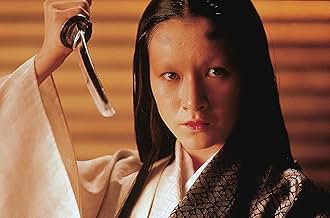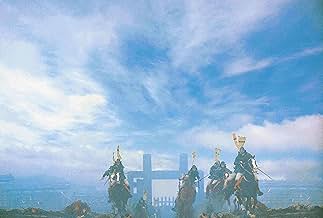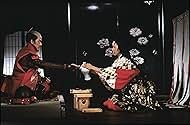No Japão medieval, um senhor feudal decide abdicar e entregar seus domínios aos seus três filhos. Mas ele não é capaz de ver que esses novos poderes irão corrompê-los e levá-los a enfrentar ... Ler tudoNo Japão medieval, um senhor feudal decide abdicar e entregar seus domínios aos seus três filhos. Mas ele não é capaz de ver que esses novos poderes irão corrompê-los e levá-los a enfrentar um ao outro, e contra ele.No Japão medieval, um senhor feudal decide abdicar e entregar seus domínios aos seus três filhos. Mas ele não é capaz de ver que esses novos poderes irão corrompê-los e levá-los a enfrentar um ao outro, e contra ele.
- Direção
- Roteiristas
- Artistas
- Ganhou 1 Oscar
- 30 vitórias e 23 indicações no total
Mansai Nomura
- Tsurumaru
- (as Takeshi Nomura)
Resumo
Reviewers say 'Ran' is celebrated for its epic scale, masterful direction, and stunning visuals. Adapted from Shakespeare's 'King Lear,' it is lauded for its intricate narrative, powerful performances by Tatsuya Nakadai and Mieko Harada, and deep exploration of power, corruption, and betrayal. The cinematography and battle scenes are noted for their grandeur. Some find its slow pace and long runtime challenging, yet it is often hailed as one of Kurosawa's finest works.
Avaliações em destaque
Based on Shakespeare's King Lear, this film follows the story of the aging warlord Hidetora who, in an attempt to restore peace, divides his kingdom between his three sons - Taro, Jiro, and Saburo - and retires from his duties. However, one of his sons sees this as unwise and is banished by his father, leaving his two brothers in charge of two of the three castles left in their hands. It isn't long before they are overtaken by greed and eventually betray their father, leaving him in the hands of a philosophical jester and a loyal retainer. This betrayal ultimately leads to war, dividing the family and driving Hidetora insane.
The remarkable script, which contains many of my favorite lines from any film, still manages to break its way through the confinement of subtitles and reveals itself to be one of the richest Kurosawa ever wrote. He has obviously worked equally hard on the look and feel of the film - the cinematography being excellent (example: the long, continuous shot of Saburo's men charging on horseback across a river).
There's also something rather frightening about it that I can't quite put my finger on. The first battle, which is the film's turning point, is the most horrifying, yet strangely beautiful, battles ever filmed. A good effect used is the loss of sound, with only Toru Takemitsu's haunting score to be heard. The entire battle lasts less than ten minutes and there is no uplifting or bombastic music to be heard, but in my opinion, it's Ran's finest scene, and thus the finest scene ever.
What Kurosawa managed to get rather than give though was excellent performances from his actors, none more brilliant than Tatsuya Nakadai's Hidetora, Mieko Harada as Lady Kaede (a woman similar to Lady Macbeth but with a different hidden agenda), and the strangely-named Peter as Kyoami.
The remarkable script, which contains many of my favorite lines from any film, still manages to break its way through the confinement of subtitles and reveals itself to be one of the richest Kurosawa ever wrote. He has obviously worked equally hard on the look and feel of the film - the cinematography being excellent (example: the long, continuous shot of Saburo's men charging on horseback across a river).
There's also something rather frightening about it that I can't quite put my finger on. The first battle, which is the film's turning point, is the most horrifying, yet strangely beautiful, battles ever filmed. A good effect used is the loss of sound, with only Toru Takemitsu's haunting score to be heard. The entire battle lasts less than ten minutes and there is no uplifting or bombastic music to be heard, but in my opinion, it's Ran's finest scene, and thus the finest scene ever.
What Kurosawa managed to get rather than give though was excellent performances from his actors, none more brilliant than Tatsuya Nakadai's Hidetora, Mieko Harada as Lady Kaede (a woman similar to Lady Macbeth but with a different hidden agenda), and the strangely-named Peter as Kyoami.
With RAN (1985) Akira Kurosawa seems to be setting up a macarbe trap. The first section of the film is slow, following an aging warlord (Tatsuya Nakadai's best acting in a long wonderous career.) dividing his castles amongst his unsavory sons. The action is slow, people talk in low tones, it's almost at snail's pace. But then, a battle scene like nothing you ever seen before explodes on the screen. The film takes a 180 degree turn and becomes more and more sinister, more compelling. You can't look away.
Akira Kurosawa (1910-1997) was responsible for elevating Japanese cinema to a front-runner in world cinema. Two of his films, RASHOMON and SEVEN SAMURAI were made in less than ten years after World War II. These films put a spotlight on Japanese culture. Some of his later films, THE HIDDEN FORTRESS, THE BAD SLEEP WELL, YOJIMBO and HIGH AND LOW became the basis for a good percentage of the major American films produced after 1960.
If you sit down to see RAN, be prepared for a jaw-dropping experience.
Akira Kurosawa (1910-1997) was responsible for elevating Japanese cinema to a front-runner in world cinema. Two of his films, RASHOMON and SEVEN SAMURAI were made in less than ten years after World War II. These films put a spotlight on Japanese culture. Some of his later films, THE HIDDEN FORTRESS, THE BAD SLEEP WELL, YOJIMBO and HIGH AND LOW became the basis for a good percentage of the major American films produced after 1960.
If you sit down to see RAN, be prepared for a jaw-dropping experience.
'Ran' is the Japanese word for chaos, riot, dissension. Akira Kurosawa's masterpiece is indeed a feast of destruction and perdition, charged with symbols and powerful in pictures like it is found very rarely in today's cinema.
The dusky story is based on Shakespeare's 'King Lear'. In the film a Japanese warlord celebrates his own downfall. Kurosawa devised this with a radical film language which works with certain imageries of colors, rapid cut sequences and a sophisticated sound design. When the colorful flags of the different armies get intermixed in a battle, when the peacefully quiet wind (which carries the soundtrack) swells to a raving storm or when long wide shots suddenly segue into shots of details that follow hot on each other's heels then you realize Kurosawa's incredible style which deeply influenced the cinema worldwide.
The drawings of the characters are equally terrific. Hidetora's jester is for a certain reason always at the side of the warlord. Their relationship alters as the film continues: Jester and warlord change their roles which makes it hard to distinguish both. Just as the sky turns from blue to grey with dark clouds, the violent past of Hidetora is catching up the aging lord. His trail of murder and predation is not forgotten, the brutally conquered land still carries the old scarves of war and exploitation which now burst out again.
The viewer can take this monumental work as a warning to the destructive power of war, which is even decades later at present and beset those who seed the violence.
The dusky story is based on Shakespeare's 'King Lear'. In the film a Japanese warlord celebrates his own downfall. Kurosawa devised this with a radical film language which works with certain imageries of colors, rapid cut sequences and a sophisticated sound design. When the colorful flags of the different armies get intermixed in a battle, when the peacefully quiet wind (which carries the soundtrack) swells to a raving storm or when long wide shots suddenly segue into shots of details that follow hot on each other's heels then you realize Kurosawa's incredible style which deeply influenced the cinema worldwide.
The drawings of the characters are equally terrific. Hidetora's jester is for a certain reason always at the side of the warlord. Their relationship alters as the film continues: Jester and warlord change their roles which makes it hard to distinguish both. Just as the sky turns from blue to grey with dark clouds, the violent past of Hidetora is catching up the aging lord. His trail of murder and predation is not forgotten, the brutally conquered land still carries the old scarves of war and exploitation which now burst out again.
The viewer can take this monumental work as a warning to the destructive power of war, which is even decades later at present and beset those who seed the violence.
One of the last great films directed by Akira Kurosawa. A father gives his land and his power to his three sons. They turn against each other and against their father.
Based on Shakespeare's King Lear 'Ran' is a very good film. It was very expensive and you can see that. Over ten years Kurosawa was busy on this project and in 1985 it was finally there. Very well made, with beautiful costumes, music and cinematography, a great direction and some good performances. Although I think Kurosawa has done better ('Rashomon', 'Ikiru', 'Yojimbo' and of course 'Shichinin no Samurai') 'Ran' definitely belongs to his best.
Based on Shakespeare's King Lear 'Ran' is a very good film. It was very expensive and you can see that. Over ten years Kurosawa was busy on this project and in 1985 it was finally there. Very well made, with beautiful costumes, music and cinematography, a great direction and some good performances. Although I think Kurosawa has done better ('Rashomon', 'Ikiru', 'Yojimbo' and of course 'Shichinin no Samurai') 'Ran' definitely belongs to his best.
Throughout his career Kurosawa strove to achieve what he called "real cinema", proclaiming that "in all [his] films, there's [only] three or four minutes" of such quality. Many would argue that he was his greatest critic. For if not in "Seven Samurai", then definitely in "Ikiru" and if not in "High and Low", then definitely in "Rashomon" he must have achieved this plateau of greatness. Well, if not in any of his other films, then definitely in "Ran" Kurosawa finally came to the apex of cinematic artistry. With the both lyrical and grandiose tone of its craft, its beautifully spare imagery, its haunting score by Toru Takemitsu, and its lead Tatsuya Nakadai's masterful understated performance, "Ran" is perhaps the most fully realized epic ever made.
The tale, which is an adaptation of Shakespeare's "King Lear", begins as Lord Hidetora Ichimonji and his court are out hunting. During a break in the hunt, Hidetora proclaims his adbication from the hight seat of the Great Lord and bestows his lands unto his three sons, dividing them up equally. He declares his oldest to be his successor in power. When his youngest son and one of his faithful nobles, express their concerns on this idea, Hidetora foolishly banishes them both, mistaking their advice as insolence. With this opening scene, the peaces are aligned and soon 'chaos' as the film is aptly named will break out throughout the land. From here, we see the downfall of Hidetora and all those who surround him. The film retains all the themes of the original play, but also thanks to Kurosawa's own input addresses a slew of even more varied ideas. Like Shakespeare, Kurosawa is greatly interested in the responsibility of the leader and the hypocrisies and ironies of an autocratic system. The most obvious though not the central theme in the whole film is war, and Kurosawa explores this theme to its full extent throughout the film. In perhaps the most grandiose battle scene every filmed, he demonstrates the destructive consequences and the paradoxical beauty of conflict.
Here, Kurosawa implements the camera with masterful skill not once employing the editing/photography tricks and gimmicks so often seen in films (even the good ones) today. This director has an awareness of the past and the history of film, but also the creative spontaneity of a true genius. In "Ran", he focuses on the more methodically simple yet artistically complex montage of Eisenstein, and on the strict compositions of Ozu. He employs the most basic and yet most artistic of techniques. Each shot is planned to precision, and each cut is made for a purpose. The coreagraphy and blocking of each scene is simple and powerful, and Kurosawa allows the actors to play out these scenes without the intrusion of the camera or the editor. Thus, the director prevents the style from eclipsing the already powerful material he has to work with. Simply put, "Ran" is a masterpiece that flows and develops like an opera, from its forebodingly peaceful ouverture to its bloody Shakespearean heart until its final, quietly subdued, and sorrowful denouement.
The tale, which is an adaptation of Shakespeare's "King Lear", begins as Lord Hidetora Ichimonji and his court are out hunting. During a break in the hunt, Hidetora proclaims his adbication from the hight seat of the Great Lord and bestows his lands unto his three sons, dividing them up equally. He declares his oldest to be his successor in power. When his youngest son and one of his faithful nobles, express their concerns on this idea, Hidetora foolishly banishes them both, mistaking their advice as insolence. With this opening scene, the peaces are aligned and soon 'chaos' as the film is aptly named will break out throughout the land. From here, we see the downfall of Hidetora and all those who surround him. The film retains all the themes of the original play, but also thanks to Kurosawa's own input addresses a slew of even more varied ideas. Like Shakespeare, Kurosawa is greatly interested in the responsibility of the leader and the hypocrisies and ironies of an autocratic system. The most obvious though not the central theme in the whole film is war, and Kurosawa explores this theme to its full extent throughout the film. In perhaps the most grandiose battle scene every filmed, he demonstrates the destructive consequences and the paradoxical beauty of conflict.
Here, Kurosawa implements the camera with masterful skill not once employing the editing/photography tricks and gimmicks so often seen in films (even the good ones) today. This director has an awareness of the past and the history of film, but also the creative spontaneity of a true genius. In "Ran", he focuses on the more methodically simple yet artistically complex montage of Eisenstein, and on the strict compositions of Ozu. He employs the most basic and yet most artistic of techniques. Each shot is planned to precision, and each cut is made for a purpose. The coreagraphy and blocking of each scene is simple and powerful, and Kurosawa allows the actors to play out these scenes without the intrusion of the camera or the editor. Thus, the director prevents the style from eclipsing the already powerful material he has to work with. Simply put, "Ran" is a masterpiece that flows and develops like an opera, from its forebodingly peaceful ouverture to its bloody Shakespearean heart until its final, quietly subdued, and sorrowful denouement.
Você sabia?
- CuriosidadesAkira Kurosawa's wife of 39 years, Yôko Yaguchi, died during the production of this film. Kurosawa halted filming for just one day to mourn before resuming work on the picture.
- Erros de gravaçãoDuring the battle at the third castle, there is a sequence where Hidetora emerges from the castle at the top of a flight of stairs and confronts enemy soldiers ascending the stairs. When he retreats, his bodyguards suddenly appear and retreat with him, even though they were not present moments earlier.
Principais escolhas
Faça login para avaliar e ver a lista de recomendações personalizadas
Detalhes
Bilheteria
- Orçamento
- US$ 11.500.000 (estimativa)
- Faturamento bruto nos EUA e Canadá
- US$ 4.314.927
- Fim de semana de estreia nos EUA e Canadá
- US$ 3.567
- 2 de jul. de 2000
- Faturamento bruto mundial
- US$ 4.388.416
- Tempo de duração
- 2 h 40 min(160 min)
- Cor
- Proporção
- 1.85 : 1
Contribua para esta página
Sugerir uma alteração ou adicionar conteúdo ausente































